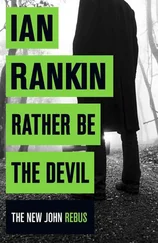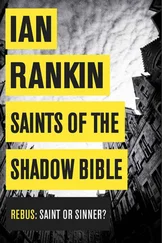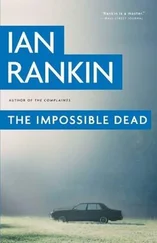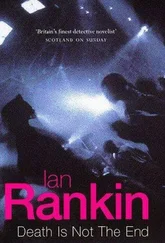‘I am retired,’ Rebus stated.
‘Funny way of showing it...’ Curt opened a drawer and lifted out a leather-bound ledger. A page had been marked. He opened the book and turned it to face Rebus.
‘Report of the post-mortem examination,’ he explained. ‘Written in the finest copperplate lettering by Professor William Shiels.’
‘Were you ever taught by him?’ Rebus asked.
‘Do I really look that old?’
‘Sorry.’ Rebus peered at the hand-written notes. ‘You’ve had a read?’
‘Professor Shiels was a great man, John.’
‘I’m not saying he wasn’t.’
‘Contusions... fractured skull... internal bleeding to the brain... We see those injuries most days even now.’
‘Drunks on a Saturday night?’ Rebus guessed. Curt nodded his agreement.
‘Drink and drugs. Our friend Mr Watt fell eleven feet on to an inch-thick steel floor. Unconscious from the fumes, no way to defend himself...’
‘The major damage was to the base of the skull,’ Rebus commented, running a finger along the words on the page.
‘We don’t always fall forehead first,’ Curt cautioned. Something in his tone made Rebus look up.
‘What is it?’ he asked.
Curt gave a twitch of the mouth. ‘I did a bit of digging. Those vats give off carbon dioxide. Ventilation’s an issue, same now as it was back then. There are plenty of recorded cases of brewery employees falling into the vats. It’s worse if someone tries to help. They dive into the beer to rescue their friend, and come up for air... take a deep breath and suddenly they’re in as much trouble as the other fellow.’
‘What a way to go...’
‘I believe one or two had to climb out and go to the toilet a couple of times prior to drowning,’ Curt offered. Rebus smiled, as was expected.
‘OK,’ he said. ‘Carbon dioxide poisoning... but what is it you’re not saying?’
‘The vat our friend fell into was empty, John. Hence the injuries. He didn’t drown in beer — there was no beer.’
Finally Rebus got it.
‘No beer,’ he said quietly, ‘meaning no fermenting. No carbon dioxide.’ His eyes met the pathologist’s. Curt was nodding slowly.
‘So what was it caused him to pass out?’ Curt asked. ‘Of course, he could have just tripped and fallen, but then I’d expect to see signs that he’d tried to stop his fall.’
Rebus glanced back at the ledger. ‘No injuries to the hands,’ he stated.
‘None whatsoever,’ Professor Curt agreed.
Rebus’s next stop was the National Library of Scotland, where a one-day reader’s pass allowed him access to a microfiche machine. A member of staff threaded the spool of film home and showed him how to wind it to the relevant pages and adjust the focus. It was a slow process — Rebus kept stopping to read various stories and sports reports, and to smile at some of the advertisements. The film contained a year’s worth of Scotsman newspapers, the year in question being 1948. I was one year old, Rebus thought to himself. Eventually he came to news of Johnny Watt’s demise. It must have been a quiet day in the office: they’d sent a journalist and a photographer. Workers had gathered in the brewery yard. They looked numbed. The manager, Mr Joseph Cropper, had been interviewed. Rebus read the piece through twice, remembering the portrait of Douglas Cropper’s grandfather — stern of face and long of sideburn. Then he spooled forward through the following seven days.
There was coverage of the funeral, along with another photograph. He wondered if the horse pulling the carriage had been borrowed from the brewery. Warriston Cemetery was the destination. Watt and his family had lived in the Stockbridge area for umpteen generations. He had no wife, but three brothers and a sister, and had served a year in the army towards the end of World War Two. Rebus paused for a moment, pondering that: you survived a war, only to die in your home town three years later. Watt was twenty years old, and had only been working at the brewery for eleven months. Joseph Cropper told the reporter that the young man had been ‘full of energy, a hard worker with excellent prospects’.
In the photo showing the procession into the cemetery, Cropper was central. There was a woman next to him, identified as his wife. She wore black, her eyes to the ground, her husband gripping her arm. She was skinny and slight, in contrast to the man she’d married. Rebus leaned in a little further towards the screen, then wound the film back to the previous photo. Twenty minutes later, he was still looking.
Albert Simms seemed surprised to see him.
Simms had just finished one of his brewery tours. Rebus was sitting at a table in the sample room, nursing the best part of a pint of IPA. It had been a busy tour: eight guests in all. They offered Rebus half-smiles and glances but kept their distance. Simms poured them their drinks but then seemed in a hurry for them to finish, ushering them from the room. It was five minutes before he returned. Rebus was behind the pumps, topping up his glass.
‘No mention of Johnny Watt’s ghost,’ Rebus commented.
‘No.’ Simms was tidying the vests and hard-hats into a plastic storage container.
‘Do you want a drink? My shout.’
Simms thought about it, then nodded. He approached the bar and eased himself on to one of the stools. There was a blue folder lying nearby, but he tried his best to ignore it.
‘Always amazes me,’ Rebus said, ‘the way we humans hang on to things — records, I mean. Chitties and receipts and old photographs. Brewery’s got quite a collection. Same goes for the libraries and the medical college.’ He handed over Simms’s drink. The man made no attempt to pick it up.
‘Joseph Cropper’s wife never had a daughter,’ Rebus began to explain. ‘I got that from Joseph’s grandson, your current boss. He showed me the archives. So much stuff there...’ He paused. ‘When Johnny Watt died, how long had you been working here, Albie?’
‘Not long.’
Rebus nodded and opened the folder, showing Simms the photo from the Scotsman , the one of the brewery workers in the yard. He tapped a particular face. A young man, seated on a corner of the wagon, legs dangling, shoulders hunched. ‘You’ve not really changed, you know. How old were you? Fifteen?’
‘You sound as if you know.’ Simms had taken the photocopy from Rebus and was studying it.
‘The police keep records too, Albie. We never throw anything away. Bit of trouble in your youth — nicking stuff; fights. Brandishing a razor on one particular occasion — you did a bit of juvenile time for that. Was that when Joseph Cropper met you? He was the charitable type, according to his grandson. Liked to visit prisons, talk to the men and the juveniles. You were about to be released; he offered you a job. But there were strings attached, weren’t there?’
‘Were there?’ Simms tossed the sheet of paper on to the bar, picked up the glass and drank from it.
‘I think so,’ Rebus said. ‘In fact, I’d go so far as to say I know so.’ He rubbed a hand down his cheek. ‘Be a bugger to prove, mind, but I don’t think I need to do that.’
‘Why not?’
‘Because you want to be caught. You’re an old man now, maybe only a short while left, but it’s been plaguing you. How many years is it, Albie? How long have you been seeing Johnny Watt’s ghost?’
Albert Simms wiped foam from his top lip with his knuckles, but didn’t say anything.
‘I’ve been to take a look at your house,’ Rebus continued. ‘Nice place. Semi-detached; quiet street off Colinton Road. Didn’t take much searching to come up with the transaction. You bought it new a couple of months after Johnny Watt died. No mortgage. I mean, houses were maybe more affordable back then, but on wages like yours? I’ve seen your pay slips, Albie — they’re in the company files too. So where did the money come from?’
Читать дальше












